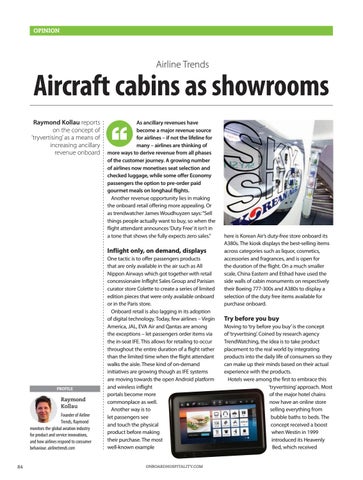OPINION
Airline Trends
Aircraft cabins as showrooms Raymond Kollau reports on the concept of ‘tryvertising’ as a means of increasing ancillary revenue onboard
As ancillary revenues have become a major revenue source for airlines – if not the lifeline for many – airlines are thinking of more ways to derive revenue from all phases of the customer journey. A growing number of airlines now monetises seat selection and checked luggage, while some offer Economy passengers the option to pre-order paid gourmet meals on longhaul flights. Another revenue opportunity lies in making the onboard retail offering more appealing. Or as trendwatcher James Woudhuyzen says: “Sell things people actually want to buy, so when the flight attendant announces ‘Duty Free’ it isn’t in a tone that shows she fully expects zero sales.”
Inflight only, on demand, displays
PROFILE
Raymond Kollau Founder of Airline Trends, Raymond monitors the global aviation industry for product and service innovations, and how airlines respond to consumer behaviour. airlinetrends.com 84
One tactic is to offer passengers products that are only available in the air such as All Nippon Airways which got together with retail concessionaire Inflight Sales Group and Parisian curator store Colette to create a series of limited edition pieces that were only available onboard or in the Paris store. Onboard retail is also lagging in its adoption of digital technology. Today, few airlines – Virgin America, JAL, EVA Air and Qantas are among the exceptions – let passengers order items via the in-seat IFE. This allows for retailing to occur throughout the entire duration of a flight rather than the limited time when the flight attendant walks the aisle. These kind of on-demand initiatives are growing though as IFE systems are moving towards the open Android platform and wireless inflight portals become more commonplace as well. Another way is to let passengers see and touch the physical product before making their purchase. The most well-known example ONBOARDHOSPITALITY.COM
here is Korean Air’s duty-free store onboard its A380s. The kiosk displays the best-selling items across categories such as liquor, cosmetics, accessories and fragrances, and is open for the duration of the flight. On a much smaller scale, China Eastern and Etihad have used the side walls of cabin monuments on respectively their Boeing 777-300s and A380s to display a selection of the duty free items available for purchase onboard.
Try before you buy Moving to ‘try before you buy’ is the concept of ‘tryvertising’. Coined by research agency TrendWatching, the idea is to take product placement to the real world by integrating products into the daily life of consumers so they can make up their minds based on their actual experience with the products. Hotels were among the first to embrace this ‘tryvertising’ approach. Most of the major hotel chains now have an online store selling everything from bubble baths to beds. The concept received a boost when Westin in 1999 introduced its Heavenly Bed, which received
